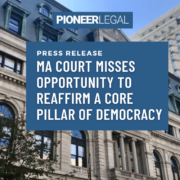Public Interest Law Firms File Direct Action with SJC to Enjoin Use of ‘Equity Theft’ Law
Action seeks to bring Massachusetts into compliance with recent U.S. Supreme Court ruling
BOSTON – The Pioneer Public Interest Law Center and Greater Boston Legal Services have filed an action with Massachusetts’ Supreme Judicial Court (SJC) to enjoin the City of Springfield from foreclosing on a home worth about $230,000 because of a $22,000 unpaid tax bill without returning the more than $200,000 difference between the value of the home and the tax liability to the homeowner.
The action comes after the U.S. Supreme Court unanimously found earlier this year in Tyler v. Hennepin County that a Minnesota statute substantially similar to the Commonwealth’s “equity theft” law was unconstitutional because it denied just compensation to a homeowner for the taking of her property. State Attorney General Andrea Campbell recently opined that Tyler renders the Massachusetts law, known as Chapter 60, unconstitutional.
“In Tyler, the Supreme Court sent a clear message that any surplus beyond the tax debt must be returned to the homeowner,” said Pioneer Public Interest Law Center President Frank Bailey. “Massachusetts is one of a minority of states that has a law like Minnesota’s, and the Court’s ruling makes it clear that such laws are unconstitutional and therefore unenforceable.”
In Tyler, the Court unanimously ruled in favor of Geraldine Tyler, an elderly woman who had lost her home valued at $40,000 because of $15,000 in unpaid property taxes. Pioneer Public Interest Law Center filed an amicus brief in the case arguing that the Minnesota statute was unconstitutional.
In the Massachusetts case, Ashley Mills is on the verge of losing her Springfield home worth around $230,000 and for which the mortgage has been fully paid, due to a $22,000 property tax debt. Currently, Chapter 60 allows Springfield — or a private actor to whom a municipality sells its right to foreclose — to keep the more than $200,000 difference between the home’s fair market value and the taxes owed.
Mills, 25, lives with her 22-month-old son and disabled mother in the home she inherited from her grandmother. The home is her only financial asset. If it is foreclosed on and she does not receive the more than $200,000 of remaining equity after the tax debt is satisfied, Ashley, her toddler, and her disabled mother are at risk of becoming homeless.
In 2016, Mills was unable to pay $1,636.70 in property taxes she owed. Over the next three years, she entered into payment agreements with the city, but was unable to catch up, largely due to a punitive 16 percent interest rate and other charges imposed under Chapter 60. In May, the City of Springfield filed a motion in the Massachusetts Land Court for judgment of foreclosure.
“Ms. Mills will continue to use every avenue available to pay her taxes and keep her home,” said Catherine M. Kay, Supervising Attorney at Community Legal Aid, who represents Mills in the Land Court foreclosure case. “But those options are limited at this point. If she cannot save her home, she should at least receive the equity in it.”
Ashley Mills’ home is but one example among dozens of unconstitutional tax takings in Massachusetts this year. As a result, in addition to enjoining the City of Springfield from taking her home, the Pioneer Public Interest Law Center and Greater Boston Legal Services are also asking the SJC to enjoin all use of Chapter 60 takings for 90 days.
The action is meant to give the state Legislature time to amend the law to conform with Tyler and allow for a permanent injunction that would prevent Springfield from taking Ms. Mills’ home unless the city makes a provision to turn over, in a reasonable time, the difference between the fair market value of the home and the amount Mills owes in taxes.
Prior to Tyler, 13 states had laws similar to Chapter 60 and the Minnesota statue the Court struck down. Since then, Minnesota, Maine and Nebraska have changed their laws. Illinois has frozen sales of the right to foreclose.
“Low-income households are especially vulnerable to tax foreclosures and Massachusetts has failed to provide these homeowners with realistic options to repay tax arrears,” said Todd S. Kaplan, Senior Attorney at Greater Boston Legal Services. “We are asking the Supreme Judicial Court to stop tax foreclosures while the Legislature works to align the tax foreclosure process with Tyler. The Legislature has an opportunity to ensure that tax foreclosures are a last resort and are done in accordance with the Constitution.”

